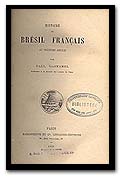

 |
 |

GAFFAREL, Paul. Histoire du Brésil Français au Seizième Siècle. Paris: Maisonneuve et Libraires, 1878. During the course of the second half of the 19th century a new European expansion all over the world, this time in the name of imperialism, aroused debates and polemics with regard to the first Europeans to have reached old and new colonial regions. As concerns Portugal's old colony in America, these polemics and debates were presented in the form of the question of the "priority of the Discovery of Brazil," which gave incentive to documental research and the exercise of the critical method. Alongside the so-called "Spanish claims" and "Portuguese claims" to the Discovery, there also appeared the "French claims."
Edited in 1878, French historian Paul Gaffarel's book Histoire du Brésil Français au seizième siècle is presented as one of the chief arguments of the "French claims." In it, Gaffarel defends that Jean Cousin was borne along by sea currents to land in Brazilian territory in 1488, before Cabral's expedition and even Christopher Columbus had reached America. Gaffarel based his thesis on part of the study by Desmarquets, Mémoires chronologiques pour servir à l’ Histoire de Dieppe et de la navigation française, which was published one century earlier.
Historian
Capistrano de Abreu also refuted the "French claim" in his dissertation for the chair of Brazilian History at the Pedro II Imperial College in 1883, entitled "Descobrimento do Brasil. Seu desenvolvimento no século XVI".Wilson Martins views Paul Gaffarel's text as "the obvious source" of Claude Lévi-Strauss's narration concerning the "spiritual adventure" of Antarctic France in Tristes Trópicos, together with the reminder that both the nineteenth-century author and the anthropologist are "of course, tributaries" of Jean de Léry in his
Histoire d’un Voyage fait en la Terre de Brésil.